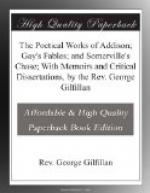In December 1700, tired of French manners, which had lost even their power of moving him to smiles, and it may be apprehensive of the war connected with the Spanish succession, which was about to inflame all Europe, Addison embarked from Marseilles for Italy. After a narrow escape from one of those sudden Mediterranean storms, in which poor Shelley perished, he landed at Savona, and proceeded, through wild mountain paths, to Genoa. He afterwards commemorated his deliverance in the pleasing lines published in the Spectator, beginning with—
“How are Thy servants blest, O Lord,”
one verse in which was wont to awaken the enthusiasm of the boy Burns,
“What though in dreadful whirls
we hung,
High on
the broken wave,” &c.
The survivor of a shipwreck is, or should be, ever afterwards a sadder and a wiser man. And Addison continued long to feel subdued and thankful, and could hardly have been more so though he had outlived that shipwreck which bears now the relation to all recent wrecks which “the storm” of November 1703, as we shall see, bore to all inferior tempests—the loss of the Royal Charter,—the stately and gold-laden bark, which, on Wednesday the 26th October 1859, when on the verge of the haven which the passengers so much desired to see, was lifted up by the blast as by the hand of God, and dashed into ten thousand pieces,—hundreds of men, women, and, alas! alas! children, drowned, mutilated, crushed by falling machinery, and that, too, at a moment when they had just been assured that there was no immediate danger, and when hope was beginning to sparkle in the eyes that were sinking into despair,—sovereigns, spray, and the mangled fragments of human bodies massed together as if in the anarchy of hell, and hurled upon the rocks. Addison, no more than one of the escaped from that saloon of horror and sea of death, could forget the special Providence by which he was saved; and the hymn above referred to, and that other still finer, commencing—
“When all Thy mercies, O my God!
My rising soul
surveys,”
seem a pillar erected on the shore to Him that had protected and redeemed him.




